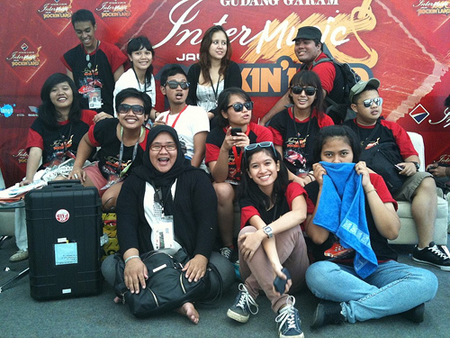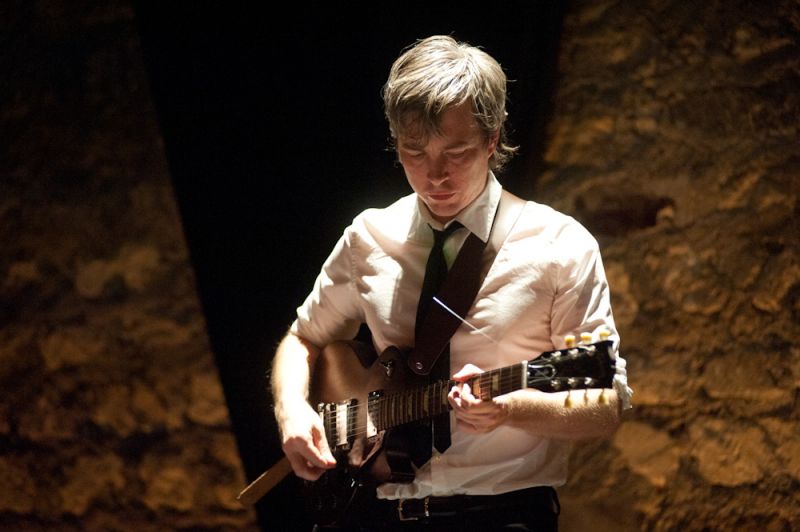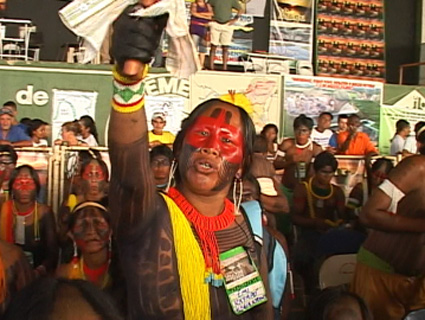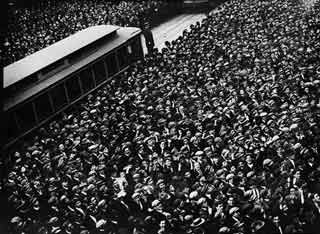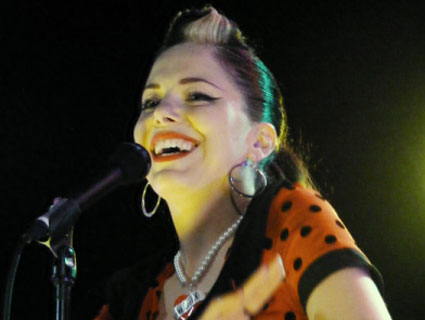
Man Alive!/Wikimedia Commons
Witnessing Imelda May’s live performance felt like attending a séance for the early blues label Chess Records and legendary rock label Sun Records—and it was one hell of a party. Beginning by cooing the last syllable of Howlin’ Wolf’s “Poor Boy” with the same legendary ache as the man himself, the singer didn’t take a second’s pause before diving straight into her signature rockabilly romp, “Psycho.” Then, with a quick snap of a cymbal, May mellowed the mood with “Kentish Town Waltz,” relishing every note as the audience sashayed to her husband Darrel Higham’s guitar riffs and multi-instrumentalist Dave Priseman’s trumpeting.
It’s May’s ability to revamp standards from the classic big bands and meld them with country rock, surfer punk, and blues that makes her an emerging force. With her two-toned coif and Betty Paige pinup looks, an infectious Irish brogue, three rock-solid albums, and a rippin’ backup band (check out double-bass player Al Gare’s blog for live updates on the band’s shenanigans), she’s much more than just a new twist on an old theme.
Mother Jones sat down with May before her August show at The Independent in San Francisco to dish on performing at burlesque clubs, producing albums, and her early beginnings with Ronnie Wood.
Mother Jones: You’ve surrounded yourself with the absolute best in the business, performing with Jeff Beck for a Les Paul tribute, hanging with Dr. John in New Orleans. What’s it like to rotate in the legend’s circle?
Imelda May: It’s terrific, absolutely terrific. I’m glad my music has gone the direction I hoped it would. I know it’s a specialist kind of music, and I didn’t want it to be a novelty act, which can happen to bands. This is what I’ve done all my life and I would have been disappointed if that was the take away. There’s an awful lot of women in the music business—it can be all about style and fashion, and I didn’t want that to be the focal point.
MJ: Like a gimmick, so to speak.
IM: Yes, I didn’t want it to be gimmicky. I don’t care about gossipy stuff. It’s absolutely brilliant to be surrounded by people I’ve admired for years. Funny enough, I started performing when I was 16, 21 years ago. I was in this little underground blues and rockabilly club in London, way too young to be there, but my brother would sneak me in and take care of me while I performed. One night, the lovely Ronnie Wood came in, jumped on stage and started jamming as I was singing. I spoke to Wood recently when I was with Jeff Beck for one of his shows, and when I was telling him the story, he was like “No way! You’re not that same girl! I remember that night and couldn’t believe there was this young child singing the blues!” So I started off on a good note.
MJ: Are you and Jeff Beck working on an album?
IM: We’re not working on anything at the moment. He asked me to sing on his album, Emotion & Commotion. We’ve jammed and recorded stuff, but I don’t know what he’s going to do with it.
MJ: Any other artists you’d kill to collaborate with?
IM: I would love to work with Leonard Cohen, Tom Waits, B.B. King. I’d love to do something with Arctic Monkeys, Miles Kane, and The Last Shadow Puppets. If I got a call from Juliette Lewis or PJ Harvey, or Chrissie Hynde, that’d be a thrill.
MJ: Who’s poster did you have on your wall growing up?
IM: My foremost heartthrob was River Phoenix. It was the movie Stand by Me, and I really loved the soundtrack and Ben E. King; it got me into that kind of music.
MJ: Your music pulls from multiple influences: country rock, rockabilly, jazz. Did you have a punk phase? Or were you into ’80s hair metal? What was your thing?
IM: I had a big time punk-rock phase and psychobilly phase. I used to go mad for the Guana Batz. I love loads of music: Blondie, The Clash, The Cramps. I tried to be a goth for a while. I’d pour baby powder on my face and paint my lips black, but that didn’t last long. I thought I looked cool at the time. But then you look back and wonder, “Why did anyone let me out of the house looking like that?”
MJ: What’s it like to be from the Liberties? If I were to visit, where would you take me?
IM: It’s a great place, really strong community: proper working-class, hard-working people who haven’t had the easiest of times. But it’s rich in character and rich in people. My family has been there for generations. And where I’d take you, definitely to Brazen Head. It’s the oldest pub in Ireland, right in Liberty Village. That’s where my brother plays traditional Irish folk music, and I’d go and join him when I’m in town.
MJ: Are your parents musicians?
IM: My dad was a dancer and instructor. He didn’t make any money off it when the ’60s arrived, because everyone started dancing on their own, so he became a painter and a decorator. And my mom was a dressmaker and seamstress. They’re both retired now. Back then, they weren’t allowed to speak during work time, so they would sing with their friends constantly. My mom sang to me all the time. Even now, she’ll go to bed and lie there for two hours in bed, every night, singing along to the radio. You can hear her singing in the dark.
MJ: How do your parents feel about you reviving the classics they grew up with?
IM: They love it. They gave me Glenn Miller, Bing Crosby, Dean Martin, all the big bands, so I got that love from them. The record collection in my house was huge. One of my brothers was into David Bowie, Meat Loaf, the other was into Elvis. I have two brothers and two sisters, it was the seven of us in a two-bedroom house, and it was a great upbringing for music and good songs. We partied a lot, and even now when we get together, we sing together; just about everyone in the family has a song that they sing.
MJ: Where do you draw inspiration from for your songs?
IM: It’s a mix of everything, mostly my own life. I just write about things that mean something and that I can write about. There’s no point in pretending. I’m not comparing myself at all to him, but I like the idea that Ernest Hemingway always wrote about certain things he knew, he knew the ins and outs, back to fronts of what he was talking about. I love that as an inspiration for myself, to keep it true to what you know. I’m always writing little lines and saving them for later.
MJ: How does your band contribute to the songwriting process? They’re all tremendous musicians; what sort of collaborative harmony do you strike with them?
IM: It’s a very good band. I’ll start writing a song on my little guitar and then when I have a few ready, I’ll call the guys together and we’ll rehearse it. I’ll have in my head exactly what I want to do, and I’ll direct them. They’re very patient with me, so I’ll say, “No, not that way,” or “No, not that one.” I’ll say I want a jungle beat or a funeral march, and they’ll do different stuff until they find the one I have in my head to match. Once I have a base and I’m happy with the song, then they’ll bring their own input. There’s no point in bringing together a talented band if you don’t let them do their thing. And they really do, they add to the sound big time. We know each other’s strengths, and I want them to be heard. I produce the albums and love that side of the process. I’ll sit in a chair with the microphone, barking orders, calling them in one by one, “Next!” We have good fun, and I want to make the most of their brilliant talents.
MJ: How about a shameless plug for Ireland’s music scene? Any artists we haven’t heard yet that we should?
IM: Yes! There’s a great ska band called The Bionic Rats. There’s a terrific pyschobilly band called Spellbound. My nephew is in a little band called Roisin O. Also check out Big Boy Bloater, he’s a rhythm and blues guy and the one to keep your eye on, I’d say. Also check out Wild Records. They’re based in the US, but everything they come out with is top notch.
MJ: Where does your fashion style come from?
IM: I love vintage. Right after our talk I’m about to head to a vintage store right around the corner. I love one-of-a-kind pieces, labels like Stop Staring! and Hell Bunny. My mother was a dressmaker, so I must have gotten my influences from her. The fashion was very flattering for women in the ’50s. They’d go with the curves instead of against them, there was no starving yourself that way. That’s why you have all these dress designers like Roland Mouret trying to copy the design and make the shape fit well, because it goes with you and your body.
MJ: You used to sing and perform at burlesque clubs. What’s the burlesque scene like nowadays?
IM: It’s a great network of people, very artistic. Burlesque is not like a strip club. I wouldn’t go to a strip club. Burlesque is beautiful: It’s art, it’s fun, it’s done with a lot of comedy—an awful lot of big wink-wink and nudge-nudge. The audience has a high percentage of women, believe it or not. There’s also beautiful feather fan dances, 1920s style, done to gorgeous music. There are men and women involved, too; it’s very vaudeville with circus performers, stilt walkers, fire and knife throwers. If it’s done well, it’s fantastic. I’ve only performed at two burlesque clubs regularly over the past seven years. One was the Flash Monkey, which used to be called the Whoopie Club, in London. The other was my double-bass player Al Gare’s club that he launched with his wife, called the Candy Box Burlesque. Most of my band plays, also some of Van Morrison’s, some of Corinne Bailey Rae’s. When I was in Los Angeles, I dragged a friend up, and she’s a legend, Satan’s Angel. She’s been performing since the ’60s, the original fire tassel twirler, and she’s in the Burlesque Hall of Fame.
MJ: If you walked into a bar in San Francisco, what would you order?
IM: I’m not much of a drinker. A Guinness every now and then, but sadly it doesn’t travel well. I do have a favorite cocktail called a Galway Gray. It’s vodka, crème de cacao, Cointreau, and a dash of lime. Tastes like a lemon sherbet with a single cream layer on the top. It’s the best. And also very lethal. During Christmas we did four gigs in London, and I had one too may of them; I had the whole hotel singing with me. I even fell on stage that night. I was in bits: full baby fall, arms hitting the deck, dressed in a Santa suit.
MJ: Oh man! Is that on YouTube?
IM: I was really disappointed it wasn’t, I thought someone would have it on there because it was a proper fall. But I just stayed on the floor and sang the whole thing down there. The whole band was laughing their heads off. It was good fun.
Click here for more music features from Mother Jones.
